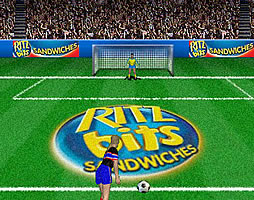DuPont's Charity Begins at Home
Submitted by Diane Farsetta on

Submitted by Diane Farsetta on
Submitted by Judith Siers-Poisson on


As a child I absolutely adored Cricket magazine, published by Carus Publishing. I now have a twelve-year old daughter who likewise enjoys their magazines for kids, but the May 2006 issue of Cobblestone Magazine floored me with its blatant pro-military marketing pitch to children.
Chances are, depending on your age, that either you or your children have read one of Carus’ publications at home, school, the library, or a doctor’s waiting room. For the smallest tykes—those under seven years old—they offer Ladybug, Babybug, and Click magazines. For six- to nine-year olds they put out Spider, Ask, and Appleseeds. And for the “tweens,” Calliope, Cobblestone, Cricket, Dig, Faces, Muse, Odyssey, and Cicada.
Breast cancer. Genital abnormalities. Distortion and damage of genetic material.
Common ingredients in cosmetic products have been linked to these hazards. As further research is conducted into the long-term and cumulative effects on cosmetics users, their children and the water supply that products are washed off into, more questions arise. Not that you'd know it by listening to the cosmetics industry.
 An important underlying issue is that the industry is largely self-regulated. While interstate trade in "adulterated or misbranded cosmetics" is prohibited, the U.S. Food and Drug Administration (FDA) does not review new cosmetics before they are marketed and cannot order recalls of hazardous cosmetics. "Cosmetic firms are responsible for substantiating the safety of their products and ingredients," reads the FDA's own explanation.
An important underlying issue is that the industry is largely self-regulated. While interstate trade in "adulterated or misbranded cosmetics" is prohibited, the U.S. Food and Drug Administration (FDA) does not review new cosmetics before they are marketed and cannot order recalls of hazardous cosmetics. "Cosmetic firms are responsible for substantiating the safety of their products and ingredients," reads the FDA's own explanation.
The industry's trade group, the Cosmetic, Toiletry, and Fragrance Association (CTFA), likes this hands-off approach. CTFA has 600 member companies, including Aveda, Clairol, L'Oréal and Unilever, and standing committees on government relations, public affairs and international issues. Its website says CTFA promotes "industry self-regulation and reasonable governmental requirements." But reasonable to who?
Submitted by Jonathan Rosenblum on
"Adult shopping decisions might be affected by a sociological change called 'age compression'--the idea that kids may be getting older younger and demanding adult products," reports Andrea Canning. By ABC's count, kids are demanding cell phones, iPods, and may even want Japan's nonalcoholic "Kids'Beer." The story twice quotes Paul Kurnit, president of KidsShop Youth Marketing Company: "There is focus on a more savvy, more informed, more inclusive kid today," he notes.
Submitted by Judith Siers-Poisson on

Submitted by Jonathan Rosenblum on
In contrast to the more than $15 billion in direct marketing spent in the U.S. to exhort children to buy food and non-food products, children often don’t get very far with the companies when they start asking questions. Olympia, Washington teacher Michi Thacker assigned her elementary students to write food manufacturers to raise questions, such as where the macaroni comes from.
Submitted by Jonathan Rosenblum on
A new antibiotic that has been found to cause four times the average rate of acute liver failure in adults continues in a trial for more than 900 children worldwide, despite criticism from a U.S. Food and Drug Administration official and a study consultant. The drug, Ketek (internationally known as Telithromycin) is manufactured by Sanofi-Aventis, a French pharmaceutical firm with U.S.
Submitted by Diane Farsetta on
The 2006 Allied Media Conference, organized by Clamor magazine's Allied Media Projects and two Bowling Green State University departments, will be held in Bowling Green, Ohio, from June 23 to 25.
Submitted by Jonathan Rosenblum on
The deal already looks suspiciously sweetened. On May 3, 2006, U.S. beverage firms announced an agreement with the Clinton Foundation and the American Heart Association gradually to pull most sweetened soft drinks from U.S. schools.
Center for Media and Democracy (CMD)
520 University Ave, Ste 305 • Madison, WI 53703 • (608) 260-9713
CMD is a 501(c)(3) tax-exempt non-profit.
© 1993-2024